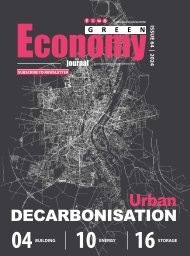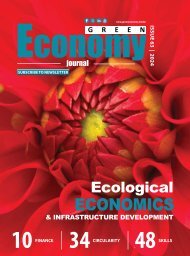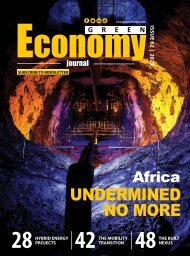+IMPACT MAGAZINE ISSUE 27
Create successful ePaper yourself
Turn your PDF publications into a flip-book with our unique Google optimized e-Paper software.
GBCSA AWARDS<br />
LEADING BY EXAMPLE<br />
The GBCSA’s annual Established Green Star Award celebrates the people who consistently<br />
contribute to the advancement of the green building movement. The Rising Green Star<br />
Award recognises emerging Green Star Accredited Professionals (APs) who are making<br />
a tangible difference in the sustainable building sector, and are evaluated for their work<br />
on leading projects and industry firsts. +Impact caught up with the four 2023 individual<br />
winners and runners-up of the GBCSA Leadership Awards.<br />
Established Green Star Awards<br />
WINNER: Simon Penso, Founder and Director of Imbue Sustainability<br />
tool for the GBCSA, backed by government and international<br />
funders. We held workshops across the country, from the<br />
streets of Alexandra township (Johannesburg) to the Cape<br />
Town suburb of Constantia, to engage with the general public<br />
in understanding what sustainability meant to each of them.<br />
Q: And your vision for South Africa’s green building<br />
movement – any significant changes you’d like to see?<br />
SP: As I mentioned in the philosophy of sustainability<br />
Simon Penso has a deep understanding of greening existing buildings and serves as a Green Star Assessor, Green Star<br />
Faculty member and Green Star Technical Advisory Group member for the GBCSA.<br />
A mechanical engineer by training, his sustainability and green building consultancy Imbue Sustainability assists clients<br />
in identifying sustainable potential, demystifying green building and gaining the ability to turn sustainability initiatives<br />
into tangible financial, economic, environmental and social returns.<br />
RUNNER-UP: Sally Misplon, Founder of Misplon Green Building Consulting<br />
being a journey, change will happen, but the rate of change,<br />
and whether it will be enough, is always a concern. I feel<br />
we have enough passionate people to accelerate change<br />
and, being a relatively small country, the “business as<br />
usual” status quo can move more swiftly compared to much<br />
larger consumer-based nations. South Africa, while facing<br />
constant challenges, innovates to face and change them, so<br />
it’s important to bear all aspects of sustainability in mind<br />
throughout this process.<br />
GBCSA AWARDS<br />
Realising projects that have a positive<br />
sustainable impact – while still achieving<br />
financial benefits – is key to unlocking<br />
a rapid transition to a sustainable future.<br />
Q: What prompted you to pursue a career in the sustainable<br />
built environment?<br />
SP: I’ve always had a passion for the environment and grew<br />
up spending most of my time in the mountains or sea. My<br />
added fascination for how things worked and were built led<br />
to my studying mechanical engineering. I was working in the<br />
commercial property sector diagnosing technical issues with<br />
buildings and running implementation projects before the<br />
green building movement gained momentum. So I took on<br />
a technical role with a company that supported my working<br />
with a greater focus on the sustainable built environment.<br />
Bruce Kerswill, founder of the Green Building Council South<br />
Africa, was instrumental in my freedom to explore this avenue.<br />
It led to “greening” listed funds, developing strategies and<br />
implementing projects, along with Green Star tool development<br />
work with the GBCSA. Through a collaborative, dynamic and<br />
close-knit sustainability consulting network, I established<br />
Imbue Sustainability, which has been an amazing journey.<br />
Q: What do you believe are the key foundations of a green<br />
building? Which of your projects embody these standards?<br />
SP: The foundations of a green building are ever-evolving,<br />
and I strongly support the philosophy that sustainability is<br />
a journey. The world as a whole is on this journey, and it<br />
cannot slow down but rather needs to speed up – this means<br />
that the starting point for every client’s journey needs to<br />
evolve along with the global community. This is evident in<br />
the simple example of VOCs [Volatile Organic Compounds]<br />
from paints: in the early days of Green Star certification,<br />
achieving zero VOC content for paints was a challenge – by<br />
contrast, today, most of these paints can be bought at major<br />
building supply outlets. This philosophy is a key foundation<br />
of green buildings, along with the equally important one that<br />
adding alternative supplies to an inefficient structure does not<br />
necessarily make it efficient. A classic instance is adding solar<br />
PV to a high energy-consuming building: this will improve its<br />
carbon footprint but it will still be inefficient.<br />
We strive to realise projects that have a positive sustainable<br />
impact while still achieving financial benefits – I believe this<br />
is key to unlocking a rapid transition to a sustainable future. In<br />
terms of project examples, a few of our client’s journeys that<br />
we’ve assisted in moulding and guiding come to mind. One of<br />
these is the truly holistic approach that we’ve been able to take<br />
with Stellenbosch University, in strategy and implementation<br />
projects, ranging from benchmarking and reporting,<br />
awareness initiatives, efficiencies and renewable energy<br />
rollout masterplans, to renewable energy implementation,<br />
green building certifications, and development of ongoing<br />
sustainable building practices.<br />
Q: Any instances of sustainability-related challenges – or<br />
pushback from stakeholders – that you’ve had to overcome?<br />
SP: This is and always will be an ongoing challenge – it’s<br />
a reality we need to constantly work with. Often within the<br />
same organisation, there are opposing stakeholders, but most of<br />
the time, such resistance can be overcome with two important<br />
aspects: awareness/education and financially viable solutions.<br />
Q: How do you convey the value of adopting green building<br />
practices to stakeholders from different backgrounds?<br />
SP: That’s a challenge I’m constantly gaining more insight into<br />
and learning from as we engage with more stakeholders. I feel<br />
it is about understanding a stakeholder’s point of reference on<br />
the topic. A project that opened my eyes greatly to this was<br />
when we were lead consultants in a consortium, including<br />
Sow & Reap, that developed a residential sustainability rating<br />
Q: What prompted you to pursue a career in the sustainable<br />
built environment?<br />
SM: My interest in sustainability in the built environment dates<br />
back to my university thesis, which centred around the drivers<br />
for green building practices in South Africa. Early in my career,<br />
I was involved in property management, overseeing a diverse<br />
portfolio of commercial, retail and industrial buildings. The<br />
turning point came when the GBCSA introduced the Existing<br />
Building Performance Tool. Recognising the potential to merge<br />
property management with eco-friendly practices, I seized the<br />
opportunity to pioneer “green property management”. This<br />
convergence aligns with my academic interest and reflects<br />
a proactive approach to harmonising property operations with<br />
sustainable, environmentally conscious principles.<br />
Q: What do you believe are the key foundations of<br />
a green building?<br />
SM: The key foundations of a green building revolve around<br />
energy efficiency, resource conservation and environmental<br />
responsibility. Implementing sustainable materials, energyefficient<br />
systems and mindful water usage are integral<br />
components. In addition, prioritising indoor air quality and<br />
promoting a healthy, occupant-friendly environment are crucial.<br />
Q: Any instances of sustainability-related challenges – or<br />
pushback from stakeholders – that you’ve had to overcome?<br />
SM: Navigating sustainability in the business world<br />
comes with its fair share of challenges and pushback from<br />
stakeholders. One instance that stands out is when we<br />
proposed implementing a comprehensive waste recycling<br />
system in a commercial project. While we were committed<br />
to reducing environmental impact, some stakeholders were<br />
concerned about initial costs and potential disruptions during<br />
the implementation. To address this, we conducted a detailed<br />
cost-benefit analysis, highlighting the long-term savings and<br />
positive environmental impact. We also engaged in transparent<br />
communication sessions, addressing concerns and showcasing<br />
the societal and reputational benefits of adopting sustainable<br />
practices. Ultimately, by presenting a compelling case for the<br />
environmental and economic advantages, we were able to<br />
secure buy-in and successfully implement the recycling system.<br />
Q: How do you convey the value of adopting green building<br />
practices to stakeholders from different backgrounds?<br />
SM: In essence, it’s about tailoring the message to resonate<br />
with each stakeholder’s priorities, whether it’s financial<br />
savings, social impact or regulatory alignment. The goal is to<br />
make it clear that embracing green building practices isn’t just<br />
good for the planet; it’s a strategic and responsible decision<br />
that brings value to their specific concerns and goals.<br />
Q: And your vision for South Africa’s green building movement<br />
– any significant changes you’d like to see?<br />
SM: My vision involves mainstream integration of sustainable<br />
practices. I aim to see widespread adoption, innovative<br />
technologies and increased community awareness, making<br />
green building a standard rather than an exception. The goal is<br />
to foster a national commitment to environmentally conscious<br />
construction, shaping a resilient and sustainable future.<br />
Founder of Misplon Green Building Consulting, Sally Misplon holds an honours degree in BSc Property Studies from the<br />
University of Cape Town. She brings a decade of expertise to the nexus of the built environment and sustainability, and<br />
excels in building operations, management and leasing, notably in commercial, retail and industrial sectors.<br />
Sally’s contributions to the GBCSA’s Green Star rating system have earned her multiple Green Leadership Awards. With<br />
qualifications for both new and existing buildings and a record of over 300 Green Star certifications, Sally’s leadership<br />
has firmly established Misplon as a leading green building consultancy.<br />
36 POSITIVE IMPACT <strong>ISSUE</strong> <strong>27</strong><br />
POSITIVE IMPACT <strong>ISSUE</strong> <strong>27</strong><br />
37

















